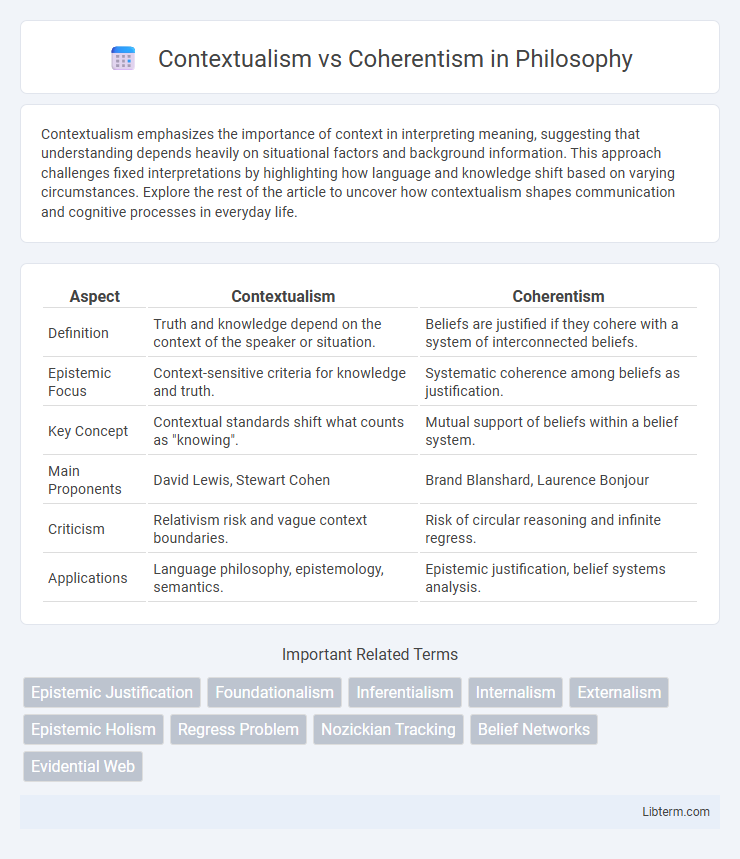Contextualism emphasizes the importance of context in interpreting meaning, suggesting that understanding depends heavily on situational factors and background information. This approach challenges fixed interpretations by highlighting how language and knowledge shift based on varying circumstances. Explore the rest of the article to uncover how contextualism shapes communication and cognitive processes in everyday life.
Table of Comparison
| Aspect | Contextualism | Coherentism |
|---|---|---|
| Definition | Truth and knowledge depend on the context of the speaker or situation. | Beliefs are justified if they cohere with a system of interconnected beliefs. |
| Epistemic Focus | Context-sensitive criteria for knowledge and truth. | Systematic coherence among beliefs as justification. |
| Key Concept | Contextual standards shift what counts as "knowing". | Mutual support of beliefs within a belief system. |
| Main Proponents | David Lewis, Stewart Cohen | Brand Blanshard, Laurence Bonjour |
| Criticism | Relativism risk and vague context boundaries. | Risk of circular reasoning and infinite regress. |
| Applications | Language philosophy, epistemology, semantics. | Epistemic justification, belief systems analysis. |
Introduction to Epistemic Theories
Contextualism in epistemology asserts that the truth conditions of knowledge claims vary depending on the context, emphasizing how standards change with different conversational settings. Coherentism, on the other hand, holds that justification arises from the coherence of a belief within a system of interconnected beliefs rather than foundational evidence. These epistemic theories offer contrasting approaches to understanding knowledge justification and the conditions under which beliefs are considered true or justified.
Defining Contextualism
Contextualism in epistemology asserts that the truth-value of knowledge claims depends heavily on the context in which they are expressed, emphasizing variable standards for justification based on situational factors. This approach contrasts with coherentism, which evaluates the justification of beliefs solely through their coherence within an entire belief system rather than external context. Defining contextualism involves understanding how shifting epistemic standards influence what counts as knowledge in different conversational or practical settings.
Understanding Coherentism
Coherentism emphasizes that beliefs are justified when they fit into a consistent and mutually supportive network of beliefs, rather than relying on foundational or self-evident truths. This approach claims that justification arises through the coherence of the entire belief system, where each belief gains support from its connections to others. Understanding coherentism requires recognizing its challenge to foundational epistemology by prioritizing systemic consistency and mutual reinforcement as the criteria for knowledge validation.
Historical Background of Both Views
Contextualism emerged prominently in the late 20th century through the works of philosophers like David Lewis and Stewart Cohen, emphasizing that the truth-conditions of knowledge claims vary with the context of the speaker. Coherentism traces its roots back to the 19th century with contributions from German philosophers such as Wilhelm Windelband and later developed by Laurence BonJour, focusing on the coherence among beliefs as a justification for knowledge. The historical development of both views reflects ongoing debates in epistemology about how knowledge is determined, either through shifting contexts or the systematic interrelation of beliefs.
Key Differences between Contextualism and Coherentism
Contextualism asserts that the truth value of knowledge claims depends on the context in which they are expressed, emphasizing the variability of standards for justification based on situational factors. Coherentism, in contrast, maintains that beliefs are justified if they cohere within a consistent and supportive system of beliefs, prioritizing internal consistency over external contextual elements. The key difference lies in Contextualism's reliance on external contextual standards versus Coherentism's focus on the internal logical cohesion of the belief system.
Contextualism: Strengths and Limitations
Contextualism provides a flexible framework for understanding knowledge by emphasizing how epistemic standards shift according to varying contexts, allowing for more nuanced interpretations of truth and justification. Its strengths lie in addressing everyday linguistic practices and explaining how knowledge ascriptions change without appealing to fixed criteria. However, contextualism struggles with the challenge of relativism and may lead to inconsistencies in evaluating knowledge claims across diverse situations.
Coherentism: Strengths and Limitations
Coherentism excels in providing a holistic approach to knowledge justification by emphasizing the consistency and mutual support among beliefs within a system, which helps avoid foundationalist pitfalls. Its strength lies in fostering a dynamic web of interconnected beliefs that can adapt and accommodate new information better than rigid foundational structures. However, coherentism faces challenges such as the potential for circular reasoning and difficulty in accounting for how beliefs relate to external reality, which can undermine its epistemic reliability.
Notable Philosophers and Their Contributions
Notable philosophers in contextualism include Stewart Cohen and Keith DeRose, who emphasized the variability of knowledge standards based on context. In coherentism, figures like Laurence BonJour and Brand Blanshard developed theories highlighting the interdependence of beliefs within a holistic system for justification. Their contributions shaped ongoing debates on epistemic justification by contrasting the fluidity of context-sensitive knowledge with the stability of coherent belief networks.
Implications for Knowledge and Justification
Contextualism emphasizes that the standards for knowledge and justification vary depending on the context, affecting how we assess claims in different situations, while Coherentism insists that beliefs are justified based on their coherence with a web of interconnected beliefs. This implies that under Contextualism, knowledge attributions are sensitive to conversational contexts, altering what counts as justification, whereas Coherentism requires systematic integration and mutual support among beliefs for justification without reliance on foundational beliefs. The divergent implications impact epistemic evaluations in areas such as skepticism, highlighting Contextualism's flexibility in knowledge claims and Coherentism's emphasis on holistic justification.
Contemporary Debates and Future Directions
Contemporary debates on Contextualism vs Coherentism highlight the tension between Contextualism's emphasis on the variability of knowledge claims based on linguistic or situational context and Coherentism's focus on the consistency of beliefs within an interconnected system. Recent philosophical discussions explore how Contextualism addresses epistemic relativity and how Coherentism tackles the integration of new evidence without foundational certainties. Future directions involve hybrid models that seek to reconcile dynamic contextual sensitivity with the systemic robustness of coherence theories in epistemic justification.
Contextualism Infographic

 libterm.com
libterm.com